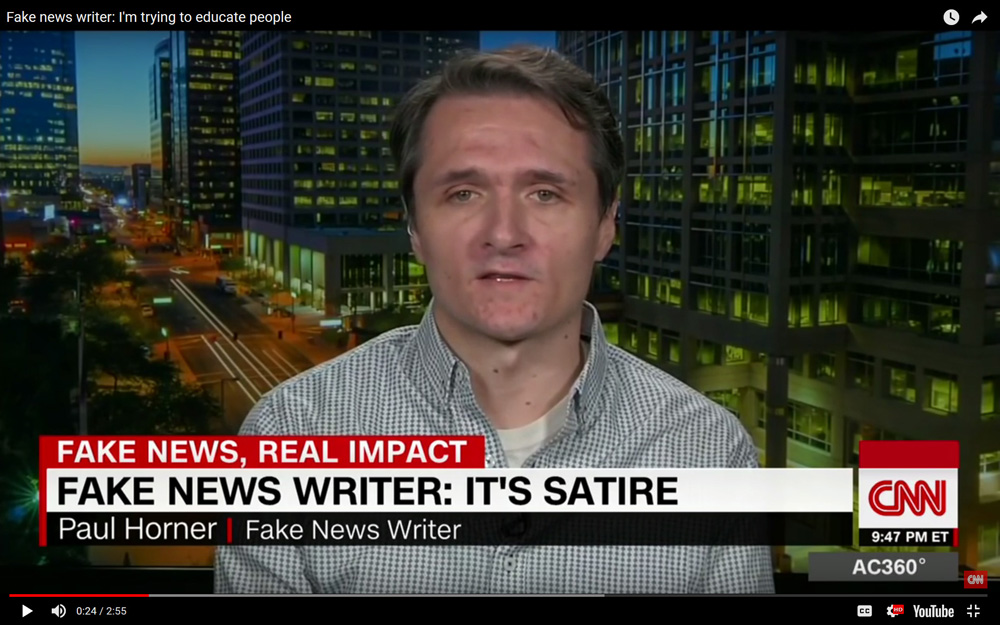A leading purveyor of fake news in the U.S. 2016 presidential election – who said his deceptions had helped elect Donald Trump but “never thought he’d actually get elected” – has died in Arizona. He was 38.

Maricopa County Sheriff’s Office spokesman Mark Casey said Tuesday authorities discovered Paul Horner dead in his bed on Sept. 18.
Casey said the Maricopa County medical examiner performed an autopsy which showed there were no signs of foul play. He said Horner had a history of prescription drug abuse and that “evidence at the scene suggested this could be an accidental overdose.”
Horner was known for writing false stories and disseminating internet hoaxes that often went viral on Facebook and hoodwinked thousands of people.
He took on greater prominence during the presidential election, when false stories were widely shared on social media.
His most successful fabrication claimed that protesters were being paid US$3,500 to disrupt Trump’s presidential campaign rallies, a claim repeated by Trump’s campaign manager, Corey Lewandowski.
Other fabrications claimed that former U.S. president Barack Obama was gay and a radical Muslim.
“I think Trump is in the White House because of me,” Horner told the Washington Post last November. “His followers don’t fact-check anything — they’ll post everything, believe anything.”

Get breaking National news
“I didn’t think it was possible for him to get elected president,” he added. “I thought I was messing with the campaign, maybe I wasn’t messing them up as much as I wanted — but I never thought he’d actually get elected … I hate Trump.”
Horner told the Post that he made US$10,000 a month from his sites.
Horner’s sites had names, like abcnews.com.co, stgeorgegazette.com or snopes.com.co, that allowed them to pass for mainstream news sites at first glance. The deception worked better on Facebook or Google than when the sites were viewed directly in a browser.
An attempt at a panel discussion about fake news on the Moscow-based network RT featuring Horner degenerated into an increasingly bizarre shouting match as the host struggled unsuccessfully for control. Eventually, Horner turned his back on the camera.
https://www.youtube.com/watch?time_continue=11&v=-Hih84V5s1A
A CNN interview with Horner last December was more dignified. Anderson Cooper charged that Horner was ” … making money off the spread of misinformation. Does it concern you at all that people believe what you’re actually writing?”
“You could say that CNN spreads misinformation,” Horner responded.
J.J., Horner’s brother, said Paul considered his work satire and explained that his brother’s unique eye for hoaxes and hypocrisy at a young age later worked as clickbait in the internet world.
“So I think that was a lot of the genius behind a lot of his work was pushing ideas that either people wanted to believe or thought was possible,” J.J. said.
Casey said toxicology reports from the medical examiner’s office are still pending. The case will remain open until those results are known and a cause of death is finalized.
J.J. Horner said they grew up in Minnesota before moving to Arizona as teenagers. He said his brother was drawing and making political cartoons at a very young age and took an interest in politics.
Horner said while his brother was pigeonholed as a Trump supporter after a member of the Trump family shared one of his stories, he was always transparent about his views and it was obvious that he wasn’t.
“I think he just wanted people to just think for themselves and be credible for their actions,” J.J. Horner said. “Read more; get more involved instead of just blindly sharing things.”
— With files from The Associated Press


Comments